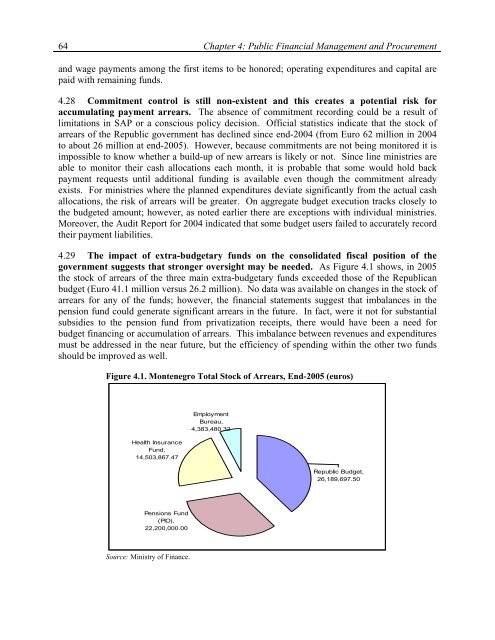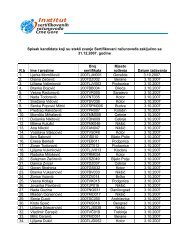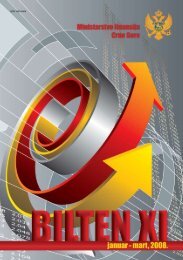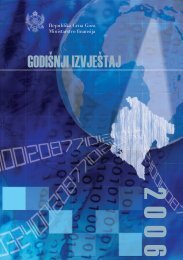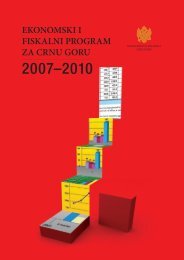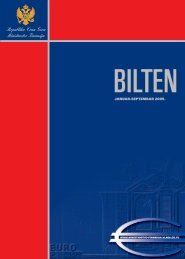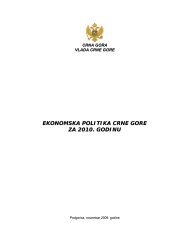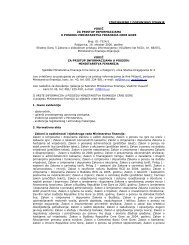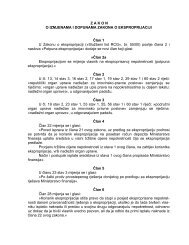Republic of Montenegro: Public Expenditure and ... - Vlada Crne Gore
Republic of Montenegro: Public Expenditure and ... - Vlada Crne Gore
Republic of Montenegro: Public Expenditure and ... - Vlada Crne Gore
You also want an ePaper? Increase the reach of your titles
YUMPU automatically turns print PDFs into web optimized ePapers that Google loves.
64 Chapter 4: <strong>Public</strong> Financial Management <strong>and</strong> Procurement<br />
<strong>and</strong> wage payments among the first items to be honored; operating expenditures <strong>and</strong> capital are<br />
paid with remaining funds.<br />
4.28 Commitment control is still non-existent <strong>and</strong> this creates a potential risk for<br />
accumulating payment arrears. The absence <strong>of</strong> commitment recording could be a result <strong>of</strong><br />
limitations in SAP or a conscious policy decision. Official statistics indicate that the stock <strong>of</strong><br />
arrears <strong>of</strong> the <strong>Republic</strong> government has declined since end-2004 (from Euro 62 million in 2004<br />
to about 26 million at end-2005). However, because commitments are not being monitored it is<br />
impossible to know whether a build-up <strong>of</strong> new arrears is likely or not. Since line ministries are<br />
able to monitor their cash allocations each month, it is probable that some would hold back<br />
payment requests until additional funding is available even though the commitment already<br />
exists. For ministries where the planned expenditures deviate significantly from the actual cash<br />
allocations, the risk <strong>of</strong> arrears will be greater. On aggregate budget execution tracks closely to<br />
the budgeted amount; however, as noted earlier there are exceptions with individual ministries.<br />
Moreover, the Audit Report for 2004 indicated that some budget users failed to accurately record<br />
their payment liabilities.<br />
4.29 The impact <strong>of</strong> extra-budgetary funds on the consolidated fiscal position <strong>of</strong> the<br />
government suggests that stronger oversight may be needed. As Figure 4.1 shows, in 2005<br />
the stock <strong>of</strong> arrears <strong>of</strong> the three main extra-budgetary funds exceeded those <strong>of</strong> the <strong>Republic</strong>an<br />
budget (Euro 41.1 million versus 26.2 million). No data was available on changes in the stock <strong>of</strong><br />
arrears for any <strong>of</strong> the funds; however, the financial statements suggest that imbalances in the<br />
pension fund could generate significant arrears in the future. In fact, were it not for substantial<br />
subsidies to the pension fund from privatization receipts, there would have been a need for<br />
budget financing or accumulation <strong>of</strong> arrears. This imbalance between revenues <strong>and</strong> expenditures<br />
must be addressed in the near future, but the efficiency <strong>of</strong> spending within the other two funds<br />
should be improved as well.<br />
Figure 4.1. <strong>Montenegro</strong> Total Stock <strong>of</strong> Arrears, End-2005 (euros)<br />
Health Insurance<br />
Fund,<br />
14,503,867.47<br />
Employment<br />
Bureau,<br />
4,383,480.32<br />
<strong>Republic</strong> Budget,<br />
26,189,697.50<br />
Pensions Fund<br />
(PIO),<br />
22,200,000.00<br />
Source: Ministry <strong>of</strong> Finance.


